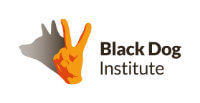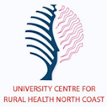Sign up below to receive monthly eMHPrac newsletters and updates about the latest digital mental health news, events, and resources.

The Federal Government has announced its pre-election budget, proposing new key mental health initiatives including accreditation guidelines for mental health programs in schools, a national measure of student wellbeing, funding to increase the psychiatry workforce, access to psychiatry support for GPs, a new case-conferencing Medicare item, and new pathways to practice for nursing, allied health, and psychology students.
The Federal Government has also detailed the proposed continuation of digital COVID-19 support services, headspace centres, and other key digital mental health programs such as the Alcohol and Drug Foundations’ Path2Help, the Hello Sunday Morning Daybreak program, Lifeline, and an expansion of the Autism: What Next? resource by Amaze Incorporated and Autism Awareness Australia.
This edition of the eMHPrac newsletter introduces a new perinatal phone referral service For When, a WellMob resource on working with young Aboriginal people, and a new eMHPrac factsheet assisting practitioners to find and evaluate safe and effective digital mental health tools. Our featured service for the month is the Butterfly Foundation’s Youth Program.
In this edition:
- New Service for Expecting and New Parents – For When
- WellMob Resource – Working with Aboriginal people: enhancing clinical practice in mental health care
- New eMHPrac resource! – Finding dMH resources
- Head to Health website BETA update seeking feedback
- TheMHS Awards – Seeking Submissions
- See the eMHPrac team at these upcoming conferences
- Read the latest dMH research articles
- This month’s featured service: Butterfly Foundation: Youth Program
New Service for Expecting and New Parents
For When
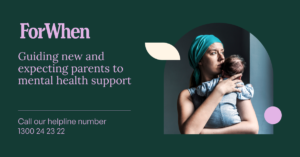
For When is a new national phone referral service, supporting expecting and new parents who might be struggling with their mental health. Their website and national phone line supports individuals and families through their perinatal journey from conception up to 12 months.
For When aims to improve the access and connection to perinatal mental health support services. For When is staffed by clinically trained professionals who are available to listen, talk through concerns, then link callers with the right local mental health services.
https://forwhenhelpline.org.au/
1300 24 23 22 (9am – 4.30pm Monday to Friday)
Email: admin@forwhenhelpline.org.au
WellMob Resource
Working with Aboriginal people: enhancing clinical practice in mental health care
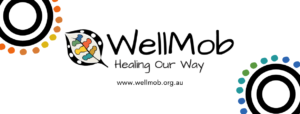
The WellMob website is a library of digital resources that show that Aboriginal and Torres Strait Islander health is a holistic concept, not just about physical health and wellbeing. It also lists apps, videos, websites and printables on a broad range of social, emotional and cultural wellbeing issues for individuals, families and communities. The WellMob website is a great addition to your tool kit in bridging the cultural gap by providing culturally safe social and emotional resources that you can use with our First Nations mob.
This video developed by NSW Dept Health shows that programs, policies and services need to move beyond physical and medical health and include the social determinants and cultural determinants of health. The video particularly shows how young people can be at risk of poor mental health. It talks about how workers can better provide culturally safe practice and build stronger connections with their younger Indigenous clients.
Click the link below to watch a short video about how you can learn to build your capacity and understanding of First Nations Australian’s holistic view of health and wellbeing, and work with our mob in a culturally empowering way.
New eMHPrac Resource!
Finding Quality Digital Mental Health Tools for Mental Health Professionals
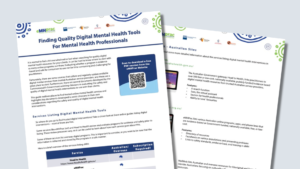
eMHPrac has just released a new factsheet for health professionals on how to find quality digital mental health services and how to evaluate the safety of digital mental health interventions. This factsheet provides a guide to where health professionals can find trusted Australian and overseas online mental health services. The services listed on these websites have been reviewed and evaluated for evidence and safety, but practitioners should always do their own evaluation before recommending a resource to a client.
The factsheet also includes key documents to assist clinicians in their own assessment of digital mental health interventions before use with clients. These documents guide clinicians through evaluating apps, programs, and forums for their suitability, evidence, safety, and security, to assist in ensuring health professionals are able to choose the right digital service for their clients.
View the factsheet online or download it at the link below and feel free to share and distribute it widely!
Head to Health Website
BETA Update Seeking Feedback
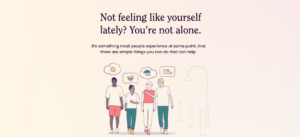
Head to Health has been speaking with hundreds of Australian mental health professionals, people with lived experience and families of people with mental illness, to develop a new trial version of their website.
Head to Health are now seeking feedback on this “Beta version”. Now is the time to register your ideas and share your experience at https://beta.headtohealth.gov.au/beta/welcome-to-our-trial-site
TheMHS Service and Research Awards
Seeking Submissions
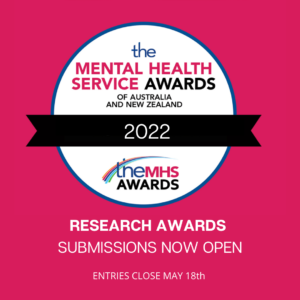
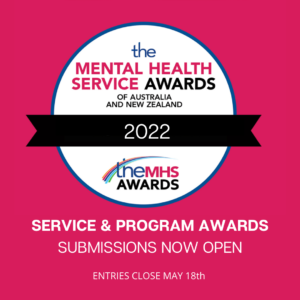
The Mental health Service Awards of Australia and New Zealand 2022 are now open for submissions! This is a great opportunity to share and showcase the excellent work you and your organisation are doing in mental health. The TheMHS Service awards recognise innovation, research excellence, best practice, and lived experience leadership in mental health services. Winners are celebrated at a Special Awards Ceremony at TheMHS Conference in October and receive three-day conference registration, financial support to attend an ‘in person’ conference and recognition on TheMHS platforms.
TheMHS is also currently taking applications for the 2022 Research Awards. These Awards include the Early Career Research Awards and the Tom Trauer Research and Evaluation Award. The Early Career Research Award provides an opportunity for post-doctorate researchers with five years’ experience or less to be recognised and rewarded for their work in mental health. The Tom Trauer Research and Evaluation Award suits a middle career candidate or research team. This award recognises excellence in research related to mental health services and programs.
For more information and to start your submission today visit: https://www.themhs.org/about-the-awards/
Award entries close May 18th!
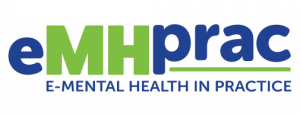
Catch us at these upcoming conferences

Australian and New Zealand Addiction Conference
9 – 10 May 2022, Gold Coast and Online
The Australian and New Zealand Addiction Conference is an event that’s been developed by the sector, for the sector. The conference provides a space to discover practical, evidence-based solutions, lived-experience lessons, and the latest research findings relating to substance use, dependency, gambling harm and other behavioural addictions.
Dr Jennifer Connolly, Senior Research Fellow at QUT and member of the eMHPrac team, will be presenting on finding digital mental health resources for addiction. You can also speak to the eMHPrac team at our trade booth, online, and in person.
To register for the conference or view the program, click the link below:
On our reading radar…
Villarreal-Zegarra D, Alarcon-Ruiz C, Melendez-Torres G, Torres-Puente R, Navarro-Flores A, Cavero V, Ambrosio-Melgarejo J, Rojas-Vargas J, Almeida G, Albitres-Flores L, Romero-Cabrera A, Huarcaya-Victoria J. Development of a Framework for the Implementation of Synchronous Digital Mental Health: Realist Synthesis of Systematic Reviews. JMIR Ment Health 2022;9(3):e34760. URL: https://mental.jmir.org/2022/3/e34760. DOI: 10.2196/34760
“The use of technologies has served to reduce gaps in access to treatment, and digital health interventions show promise in the care of mental health problems. However, to understand what and how these interventions work, it is imperative to document the aspects related to their challenging implementation.
The aim of this study was to determine what evidence is available for synchronous digital mental health implementation and to develop a framework, informed by a realist review, to explain what makes digital mental health interventions work for people with mental health problems.
The SPIDER (Sample, Phenomenon of Interest, Design, Evaluation, and Research type) framework was used to develop the following review question: What makes digital mental health intervention with a synchronous component work on people with mental health problems, including depression, anxiety, or stress, based on implementation, economic, quantitative, qualitative, and mixed methods studies? The MEDLINE, EBM Review, PsycINFO, EMBASE, SCOPUS, CINAHL Complete, and Web of Science databases were searched from January 1, 2015, to September 2020 with no language restriction. A Measurement Tool to Assess Systematic Review-2 (AMSTAR-2) was used to assess the risk of bias and Confidence in Evidence from Reviews of Qualitative Research (CERQual) was used to assess the confidence in cumulative evidence. Realist synthesis analysis allowed for developing a framework on the implementation of synchronous digital mental health used a grounded-theory approach with an emergent approach.
A total of 21 systematic reviews were included in the study. Among these, 90% (n=19) presented a critically low confidence level as assessed with AMSTAR-2. The realist synthesis allowed for the development of three hypotheses to identify the context and mechanisms in which these interventions achieve these outcomes: (1) these interventions reach populations otherwise unable to have access because they do not require the physical presence of the therapist nor the patient, thereby tackling geographic barriers posed by in-person therapy; (2) these interventions reach populations otherwise unable to have access because they can be successfully delivered by nonspecialists, which makes them more cost-effective to implement in health services; and (3) these interventions are acceptable and show good results in satisfaction because they require less need of disclosure and provide more privacy, comfortability, and participation, enabling the establishment of rapport with the therapist.
We developed a framework with three hypotheses that explain what makes digital mental health interventions with a synchronous component work on people with mental health problems. Each hypothesis represents essential outcomes in the implantation process.”
De Kock J, Latham H, Cowden R, Cullen B, Narzisi K, Jerdan S, Munoz S, Leslie S, Stamatis A, Eze J. Brief Digital Interventions to Support the Psychological Well-being of NHS Staff During the COVID-19 Pandemic: 3-Arm Pilot Randomized Controlled Trial. JMIR Ment Health 2022;9(4):e34002. URL: https://mental.jmir.org/2022/4/e34002. DOI: 10.2196/34002
“Health and social care staff are at high risk of experiencing adverse mental health (MH) outcomes during the COVID-19 pandemic. Hence, there is a need to prioritize and identify ways to effectively support their psychological well-being (PWB). Compared to traditional psychological interventions, digital psychological interventions are cost-effective treatment options that allow for large-scale dissemination and transcend social distancing, overcome rurality, and minimize clinical time.
NHS Highland (NHSH) frontline staff volunteers (N=169) were randomly assigned to the newly developed NHSH Staff Wellbeing Project (NHSWBP), an established digital intervention (My Possible Self [MPS]), or a waitlist (WL) group for 4 weeks. Attempts were made to blind participants to which digital intervention they were allocated. The interventions were fully automated, without any human input or guidance. We measured 5 self-reported psychological outcomes over 3 times points: before (baseline), in the middle of (after 2 weeks), and after treatment (4 weeks). The primary outcomes were anxiety (7-item General Anxiety Disorder), depression (Patient Health Questionnaire), and mental well-being (Warwick-Edinburgh Mental Well-being Scale). The secondary outcomes included mental toughness (Mental Toughness Index) and gratitude (Gratitude Questionnaire-6).
Retention rates mid- and postintervention were 77% (n=130) and 63.3% (n=170), respectively. Postintervention, small differences were noted between the WL and the 2 treatment groups on anxiety (vs MPS: Cohen d=0.07, 95% CI -0.20 to 0.33; vs NHSWBP: Cohen d=0.06, 95% CI -0.19 to 0.31), depression (vs MPS: Cohen d=0.37, 95% CI 0.07-0.66; vs NHSWBP: Cohen d=0.18, 95% CI -0.11 to 0.46), and mental well-being (vs MPS: Cohen d=-0.04, 95% CI -0.62 to -0.08; vs NHSWBP: Cohen d=-0.15, 95% CI -0.41 to 0.10). A similar pattern of between-group differences was found for the secondary outcomes. The NHSWBP group generally had larger within-group effects than the other groups and displayed a greater rate of change compared to the other groups on all outcomes, except for gratitude, where the rate of change was greatest for the MPS group.
Our analyses provided encouraging results for the use of brief digital psychological interventions in improving PWB among health and social care workers. Future multisite RCTs, with power to reliably detect differences, are needed to determine the efficacy of contextualized interventions relative to existing digital treatments.”
This edition’s featured service…

Butterfly Foundation: Youth Program
An online treatment program from the Butterfly Foundation for young Australians in need of help with dieting or body image concerns.
About Butterfly Foundation
Butterfly Foundation is a free, online support service for anyone needing guidance with an eating disorder. They offer counselling, referrals, support, psychoeducation, and guidance via telephone, web chat, online support groups and email for clinicians, teachers, and coaches working with groups vulnerable to eating disorders and body image issues, as well as individuals dealing with an eating disorder or at-risk of developing an eating disorder, their friends, family, and carers.
About Butterfly Foundation’s Youth Program
Butterfly Foundation’s Youth Program is a virtual, skills-based group therapy treatment program for young Australians experiencing symptoms of disordered eating, Anorexia Nervosa, Bulimia Nervosa or Binge Eating Disorder (BED). The program is based on Enhanced Cognitive Behaviour Therapy (CBT-E), delivered by clinicians trained to work with young people with body image issues and eating disorders. By providing a safe, supportive, recovery-focused environment the Youth Program aims to help participants;
- Develop skills to manage stress and emotions
- Manage relationships
- Increase mindfulness
- Learn self-compassion
- Improve body image
- Reduce eating disorder symptoms
- Build a healthier relationship with food
The program runs for 12 weeks, with a total of 22 sessions, all held on Zoom. Groups are help twice a week for the first 10 weeks, then once a week for the final 2 weeks, providing participants with the opportunity to explore, understand, and gain insights into their thoughts, feelings and concerns around their own body image and food. The program also includes supportive food challenge sessions, teaching skills and coping strategies to change participants’ behaviours around food.
Who is Butterfly Foundation’s Youth Program for?
The Youth Program is designed for young Australians aged 18 to 25 experiencing symptoms of disordered eating, Anorexia Nervosa, Bulimia Nervosa, Bing Eating Disorder (BED), who are seeking to learn skills for recovery. Potential participants must have a BMI greater than 18, agree to be monitored by a GP during the course of the program, agree to work with a community treatment team, be self-sufficient with eating and meals, and motivated to work towards recovery.
The Butterfly Foundation clinical staff assesses all participants for suitability before recommending entry into the program.
Is there a cost to use Butterfly Foundation’s Youth Program?
There is no cost to apply or participate in Butterfly Foundation’s Youth Program.
How to access Butterfly Foundation’s Youth Program
Registration and referrals are always open however, there is an assessment process before applicants are accepted into upcoming programs.
Individuals can register their interest by completing an online form including their personal details and the details of their GP. If applicants do not have a GP, they can still register and Butterfly Foundation will help them to find a GP to support them through the program.
Health professionals can refer a client by downloading a referral form to be submitted via email to treatment@butterfly.org.au
More information about Butterfly Foundation’s Youth Program, registrations, and upcoming programs for 2022 can be found at https://butterfly.org.au/get-support/outpatient-treatment-programs/youth-program/



